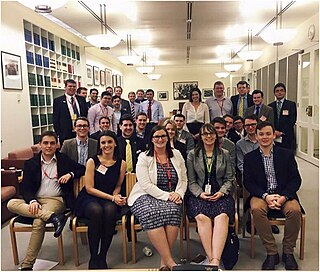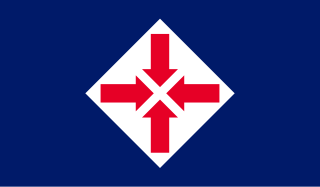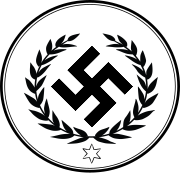
The Liberal Party of Australia is a centre-right political party in Australia. The party is one of the two major parties in Australian politics, the other being the Australian Labor Party. The Liberal Party was founded in 1944 as the successor to the United Australia Party. Historically the most successful political party in Australia's history, the party is now in opposition at a federal level and does not hold government in any Australian state or territory with the exception of the island state of Tasmania.
The National Party of Australia, also known as The Nationals or The Nats, is a centre-right, agrarian political party in Australia. Traditionally representing graziers, farmers, and regional voters generally, it began as the Australian Country Party in 1920 at a federal level.

The Communist Party of Australia (CPA), known as the Australian Communist Party (ACP) from 1944 to 1951, was an Australian communist party founded in 1920. The party existed until roughly 1991, with its membership and influence having been in a steady decline since its peak in 1945. Like most communist parties in the West, the party was heavily involved in the labour movement and the trade unions. Its membership, popularity and influence grew significantly during most of the interwar period before reaching its climax in 1945, where the party achieved a membership of slightly above 22,000 members. Although the party did not achieve a federal MP, Fred Paterson was elected to the Parliament of Queensland at the 1944 state election. He won re-election in 1947 before the seat was abolished. The party also held office in over a dozen local government areas across New South Wales and Queensland.

Francis Joseph Collin is an American former political activist and Midwest coordinator with the American Nazi Party, later known as the National Socialist White People's Party. After being ousted for being partly Jewish, in 1970, Collin founded the National Socialist Party of America. (N.S.P.A.) In the late 1970s, his planned march in the predominantly Jewish suburb of Skokie, Illinois was challenged; however, the American Civil Liberties Union defended Collin's group's freedom of speech and assembly in a case that reached the United States Supreme Court to correct procedural deficiencies. Specifically, the necessity of immediate appellate review of orders restraining the exercise of First Amendment rights was strongly emphasized in National Socialist Party v. Village of Skokie, 432 U.S. 43 (1977). Afterward, the Illinois Supreme Court held that the party had a right to march and to display swastikas, despite local opposition, based on the First Amendment to the United States Constitution. Collin then offered a compromise, offering to march in Chicago's Marquette Park instead of Skokie. After Collin was convicted and sentenced in 1979 for child molestation, he lost his position in the party.

The Australia First Party (AFP), officially known as the Australia First Party (NSW) Incorporated, is an Australian nationalist political party founded in 1996 by Graeme Campbell, a former member of the Australian Labor Party. The policies of the party have been described as nationalist, anti-multicultural and economically protectionist, advocating for strict immigration controls, the prioritization of Australian citizens in employment, and the promotion of Australian culture and values. The party's logo includes the Southern Cross of the Eureka Flag.

The National Socialist Party of America (NSPA) was a Chicago-based organization founded in 1970 by Frank Collin shortly after he left the National Socialist White People's Party. The NSWPP had been the American Nazi Party until shortly after the assassination of its leader George Lincoln Rockwell in 1967. Collin, a follower of Rockwell, developed differences with his successor Matt Koehl.

Joseph Charles Tommasi was an American Neo-Nazi who founded the National Socialist Liberation Front. He advocated extremism and armed guerrilla warfare against the U.S. government and what he called its "Jewish power structure." Tommasi wanted anarchy and lawlessness so that the "system" could be attacked without protection. Tommasi was derisively nicknamed "Tomato Joe" by rival neo-Nazis because of his Italian heritage and "less than Nordic complexion." He was later expelled from the group for using drugs and misusing group funds.
Colin King-Ansell is a prominent figure in far-right politics in New Zealand. He has been described as "New Zealand’s most notorious Nazi proponent and Holocaust denier".
Peter Joseph "Jack" van Tongeren is the former leader of the West Australian Neo-Nazi group Australian Nationalist Movement (ANM), a white supremacist and far-right group, and a successor organisation called the Australian Nationalist Worker's Union (ANWU). He served 13 years, one month, and six days in prison from 1989 to 2002 for theft and arson, having robbed and firebombed businesses owned by Asians in Western Australia. In the late 1980s it was revealed Van Tongeren's father was of part-Javanese ancestry. Nevertheless, Van Tongeren resumed anti-Asian activities upon his release in 2002, leading to further convictions, in 2006.

James Saleam is an Australian political scientist, academic, political activist, and author noted for his involvement in Australian nationalism, anti-globalism, and the anti-immigration movement. He is currently the chairman of the Australia First Party. He came to prominence after founding National Action, a militant nationalist organization active in Sydney during the 1980s.
National Socialist Party of America v. Village of Skokie, 432 U.S. 43 (1977), arising out of what is sometimes referred to as the Skokie Affair, was a landmark decision of the US Supreme Court dealing with freedom of speech and freedom of assembly. This case is considered a "classic" free speech case in constitutional law classes. Related court decisions are captioned Skokie v. NSPA, Collin v. Smith, and Smith v. Collin. The Supreme Court ruled 5–4, per curiam. The Supreme Court's 1977 ruling granted certiorari and reversed and remanded the Illinois Supreme Court's denial to lift the lower court's injunction on the NSPA's march. In other words: the courts decided a person's assertion that speech is being restrained must be reviewed immediately by the judiciary. By requiring the state court to consider the neo-Nazis' appeal without delay, the U.S. Supreme Court decision opened the door to allowing the National Socialist Party of America to march.

The Young Nationals is the youth division of the National Party of Australia, with membership open to those between 15 and 35 years of age. Young Nationals also have full party membership, and partake in state and federal conferences with equal rights to members of the senior party. They are active in National Party campaigning during all state and federal elections. It was first formed in Queensland in 1957, with other states following in subsequent years.
The Confederate Action Party of Australia (CAP) was an Australian far-right political party which first appeared in the 1992 Queensland state election. Its 12 candidates polled an average of 10.13% in the seats they contested. Overall, CAP achieved 1.4% of the statewide vote and did not win any seats. The party was registered on 10 September 1992 with the Australian Electoral Commission and contested the 1993 Australian federal election in a number of states. It was deregistered on 29 July 1993. and collapsed in August 1993 amid allegations of financial impropriety, vote rigging, infighting and fraud.

National Action was a militant Australian white nationalist group founded in 1982 by Jim Saleam, a far-right activist, and David Greason. Saleam had been a member of the short-lived National Socialist Party of Australia as a teenager during the 1970s.
The Australian Labor Party split of 1955 was a split within the Australian Labor Party along ethnocultural lines and about the position towards communism. Key players in the split were the federal opposition leader H. V. "Doc" Evatt and B. A. Santamaria, the dominant force behind the "Catholic Social Studies Movement" or "the Movement".
Socialism in Australia dates back at least as far as the late-19th century. Notions of socialism in Australia have taken many different forms including utopian nationalism in the style of Edward Bellamy, the democratic socialist reformist electoral project of the early Australian Labor Party (ALP), and the revolutionary Marxism of parties such as the Communist Party of Australia.
The Australian National Socialist Party (ANSP) was a minor Australian Neo-Nazi party that was formed in 1962. It merged into the National Socialist Party of Australia, which was originally a splinter group, in 1968.

The Victorian Liberal Party, officially known as the Liberal Party of Australia (Victorian Division) and branded as Liberal Victoria, is the state division of the Liberal Party of Australia in Victoria. It was formed in 1944. It became the Liberal and Country Party (LCP) in 1949, and simplified its name to the Liberal Party in 1965. The party sits on the centre-right to right-wing of the Australian political spectrum.
Far-right politics in Australia describes authoritarian ideologies, including fascism and White supremacy as they manifest in Australia.

The National Socialist Network (NSN) is an Australian neo-Nazi political organisation formed from two far-right organisations, the Lads Society and the Antipodean Resistance, in 2020. The organisation, based in Melbourne, claims to be active in all six state capitals and several regional cities. The group has used the protests against COVID-19 policies and other methods, such as media manipulation and attention-grabbing, to recruit new members.













